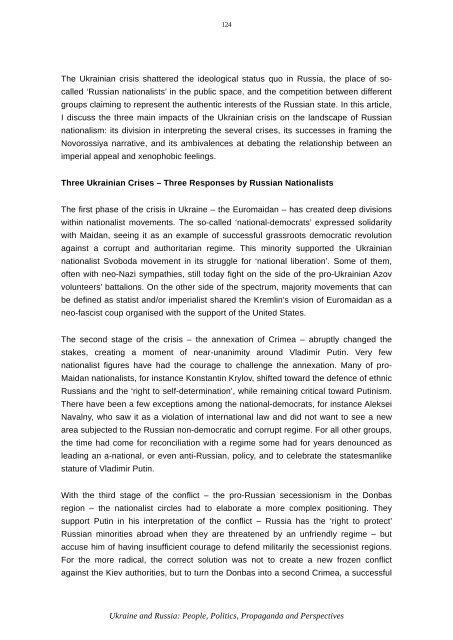Ukraine-and-Russia-E-IR
Ukraine-and-Russia-E-IR
Ukraine-and-Russia-E-IR
You also want an ePaper? Increase the reach of your titles
YUMPU automatically turns print PDFs into web optimized ePapers that Google loves.
124<br />
The Ukrainian crisis shattered the ideological status quo in <strong>Russia</strong>, the place of socalled<br />
‘<strong>Russia</strong>n nationalists’ in the public space, <strong>and</strong> the competition between different<br />
groups claiming to represent the authentic interests of the <strong>Russia</strong>n state. In this article,<br />
I discuss the three main impacts of the Ukrainian crisis on the l<strong>and</strong>scape of <strong>Russia</strong>n<br />
nationalism: its division in interpreting the several crises, its successes in framing the<br />
Novorossiya narrative, <strong>and</strong> its ambivalences at debating the relationship between an<br />
imperial appeal <strong>and</strong> xenophobic feelings.<br />
Three Ukrainian Crises – Three Responses by <strong>Russia</strong>n Nationalists<br />
The first phase of the crisis in <strong>Ukraine</strong> – the Euromaidan – has created deep divisions<br />
within nationalist movements. The so-called ‘national-democrats’ expressed solidarity<br />
with Maidan, seeing it as an example of successful grassroots democratic revolution<br />
against a corrupt <strong>and</strong> authoritarian regime. This minority supported the Ukrainian<br />
nationalist Svoboda movement in its struggle for ‘national liberation’. Some of them,<br />
often with neo-Nazi sympathies, still today fight on the side of the pro-Ukrainian Azov<br />
volunteers’ battalions. On the other side of the spectrum, majority movements that can<br />
be defined as statist <strong>and</strong>/or imperialist shared the Kremlin’s vision of Euromaidan as a<br />
neo-fascist coup organised with the support of the United States.<br />
The second stage of the crisis – the annexation of Crimea – abruptly changed the<br />
stakes, creating a moment of near-unanimity around Vladimir Putin. Very few<br />
nationalist figures have had the courage to challenge the annexation. Many of pro-<br />
Maidan nationalists, for instance Konstantin Krylov, shifted toward the defence of ethnic<br />
<strong>Russia</strong>ns <strong>and</strong> the ‘right to self-determination’, while remaining critical toward Putinism.<br />
There have been a few exceptions among the national-democrats, for instance Aleksei<br />
Navalny, who saw it as a violation of international law <strong>and</strong> did not want to see a new<br />
area subjected to the <strong>Russia</strong>n non-democratic <strong>and</strong> corrupt regime. For all other groups,<br />
the time had come for reconciliation with a regime some had for years denounced as<br />
leading an a-national, or even anti-<strong>Russia</strong>n, policy, <strong>and</strong> to celebrate the statesmanlike<br />
stature of Vladimir Putin.<br />
With the third stage of the conflict – the pro-<strong>Russia</strong>n secessionism in the Donbas<br />
region – the nationalist circles had to elaborate a more complex positioning. They<br />
support Putin in his interpretation of the conflict – <strong>Russia</strong> has the ‘right to protect’<br />
<strong>Russia</strong>n minorities abroad when they are threatened by an unfriendly regime – but<br />
accuse him of having insufficient courage to defend militarily the secessionist regions.<br />
For the more radical, the correct solution was not to create a new frozen conflict<br />
against the Kiev authorities, but to turn the Donbas into a second Crimea, a successful<br />
<strong>Ukraine</strong> <strong>and</strong> <strong>Russia</strong>: People, Politics, Propag<strong>and</strong>a <strong>and</strong> Perspectives


